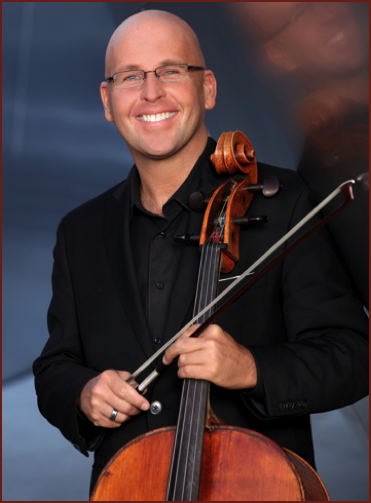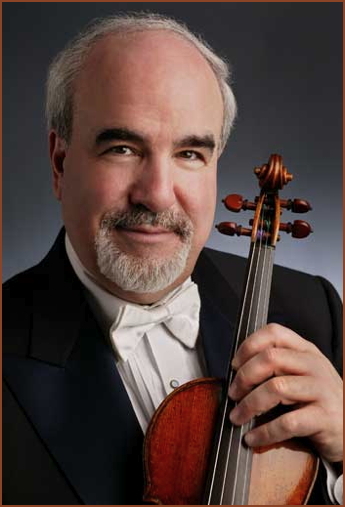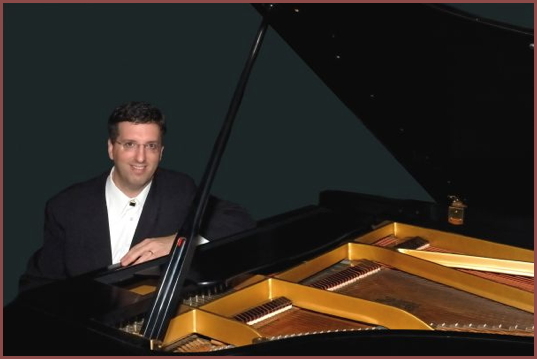In the world of Classical music, one of the most exciting developments of 2013 is pianist Jeffrey Biegel's very recent announcement of the formation of a new piano trio consisting of himself, violinist Glenn Dicterow and cellist Robert DeMaine. It might seem an impossible dream come true, but one that is clearly hand-in-glove with la forza del Destino. It all started with a few timely e-mails from Jeffrey which dovetailed with another strategic announcement -- Glenn Dicterow, Concertmaster of the New York Philharmonic since 1980, would be retiring at the end of the 2013-14 season. "I thought that if I didn't ask him then," said Jeffrey, "I never would."
Regarding his retirement, Glenn told me he was already nostalgic about it. "So often, I'll go out and play a very well known work and realize it's for the last time. For instance, in Vail, Colorado, when we were in residence there this past summer, I played my last Scheherazade. A few weeks ago, I played my last Thus Spake Zarathustra by Richard Strauss. Being on stage, being enveloped by that sound -- I don't think that's going to happen again. It's been almost forty years, counting my L.A. Philharmonic days. It's going to be bittersweet. I won't get that feeling again, to sit among that many great musicians and have a huge Mahler symphony sound. I will miss that part of it."
Shortly after sparking the violinist's attention, Jeffrey contacted Robert DeMaine, Principal Cellist with the Los Angeles Philharmonic since 2012. The three musicians agreed to meet October 28th, in Manhattan, at Steinway Hall on 57th Street. They would do a single read-through of the Brahms C Major Trio. "The piece is so incredible," said Glenn. "It's why people gravitate toward piano trios. The sound is so complete."
"I'm going into a part of my life," said Jeffrey,
where I really want to embrace the old world style of playing that is really more me in a way. I'm not saying I won't do new things. But in regard to chamber music, I wanted to 'go home'. Timing is everything, of course. It was a very beautiful sound that came into that room at Steinway Hall -- and I'm speaking more from the standpoint of the strings. A pianist is going to support and weave around the texture. But the string players must have a magic within themselves. I think those two have that magic -- that kind of instinctive intersection of sound where they breathe together, almost like one instrument, encompassing the range of the violin and cello. That's what makes it work and why they hit it off so well. They spoke the same language. That's first base for any kind of chamber group.
"I went to New York thinking nothing was going to come of this," said Robert DeMaine.
I've admired Glenn Dicterow my whole life. I grew up as this kid in Oklahoma City watching PBS broadcasts and seeing Glenn Dicterow on television every time the New York Philharmonic was on. I really do look up to him immensely. And Jeffrey, too. In my opinion, both Jeffrey and Glenn are two of the greatest living performers on their instruments. I've had a lot of great collaborative music-making. When we met at Steinway -- in one of those hallowed rooms, where all of these great instrumentalists have played -- none of us were warmed-up. It was first thing in the morning. I had just taken a redeye from L.A. and was not in my top form. But the atmosphere in the room was right. I just knew it. It belonged that way.
As I spoke to each of the musicians, the term "old school" kept popping up. With Jeffrey being in the middle at 52 and at least a decade's difference younger than Glenn, and Robert just turning 44 -- each of them had a different hit on old school.
"When I heard Jeffrey for the first time," said Glenn,
I thanked God that I have YouTube. I saw the video of him doing the Brahms Piano Concerto No. 2 and thought 'this is the old school way of playing' -- something that speaks to me. I am Old School! I'm very much inspired by the great artists of the 1900s, from Heifetz and Horowitz onwards. That's where I get most of my musical inspirations. Even though Jeffrey is younger than I am, it is very much the same. I heard Robert DeMaine when he was on tour with the L.A. Philharmonic and played at Avery Fisher Hall. Dudamel was conducting. On the first half, they played a more contemporary piece that had a lot of cello solos. I heard that sound and I was very drawn to it. Two months ago, the three of us are sitting at Steinway Hall. Everything clicked -- we all understood each other -- three like minds in sort-of old school philosophy. Everything just gelled. Then we said, 'Let's get a name!' and Jeffrey came up with it. He is a go-getter, as you know.
For Jeffrey Biegel, old school is about returning to the time when the music was composed. In an increasingly fast-paced world, where technology is pushing everything to warp speed, both artist and consumer want everything quick and easy.
When Glen Dicterow plays, you know he has had many years of playing under great conductors such as Zubin Mehta, Kurt Masur. It makes a difference, I hear it in his sound. A lot of the music we see most frequently, even pre-1950 / pre-television -- is already old school because the world is slower. Communication was slower then, the pace was slower. I'm sure the big cities were hustling and bustling, but the speed of communication was slower. People took time to get results. People living in a faster world expect results to come faster. In the musical sense, when you take more time, you end up delving deeper into the music. You don't just learn it quickly for a concert and go flying-out the next morning. Old School is not just the repertoire, it's the speed in which we learned, the time that people took to do things. For myself, it's in the way I was trained. The reason why I get the sound I want is because I was exposed to it by people like Adele Marcus. I was lucky that way.
For young cellist Robert DeMaine, I framed the question with a slightly different twist. How does he respond when young students ask him about training, especially with all the connotations of old school in mind?
"Old school is evocative of a generation that is no longer with us," said Robert.
The Grim Reaper was busy this past year. With the passing of cellist János Starker, it's almost like the death of an era right there. I would recommend to young students to not be so obsessed with the superstar cellists who are around today. There is an instant gratification and availability with these things through YouTube. It's staggering! I'm convinced that if YouTube had existed when I was a kid, I would be a much better cellist than I am today. The danger in that, is that kids often think you learn just by watching videos instead of having a great teacher. In this area, there's no such thing as being a successful autodidact. You have to apprentice. You have to work with a master. You have to earn your wings from Day One. You have to practice scales and arpeggios and go to tons of concerts and approach everything with humility.

ROBERT DeMAINE. Photo, courtesy of the artist
When people ask me how I built my career -- 'How did you get to where you are?' -- without going into too much detail, I'll say that I never expected to be a Principal Cellist in a major orchestra. But that's how it ended up. What I realized is that opportunity comes in many forms and it doesn't just knock on the front door. It knocks on the back door, it comes from the basement. You have to see that opportunity when it presents itself, even if it seems trivial. There's no prescribed formula for it, you need to make your own story. That's where the magic is. Everybody has their own little mountain to climb -- or their own little dig, whatever. In my own little corner of the world, I can take care of my mountain. I don't believe in living my life out of a text book. I don't prescribe to the rules all the time. Eventually, we have to come up with our own way of doing things. I idolized the great French cellist, Pierre Fournier. His sound spoke to me from a very early age.
Now it's on to professional management, bookings, social media, recordings and fans like me swarming backstage. "There are a lot of different variables at play," said Robert.
If a series wants a certain theme in the program or if they want a certain menu like a Classical trio, a Romantic trio, something 20th Century -- it doesn't matter what nationality -- they will give us that. Some presenters are more apt to give us free reign. I think most often they would probably defer to the group. As far as the decision-making within the group, I feel it will probably be absolutely mutual. In a way, it's a little bit more up to the pianist because there are so many more notes. That's not to say the piano is a more difficult instrument -- you know? -- all they do is press buttons! I'm sure that Jeffrey has got it all mapped out. When you're a musician of his caliber, you are juggling -- not oranges, but chainsaws. Jeffrey's got, like, ten chainsaws in the air. No matter how many of them are ready to come down, he's always thinking outside the box. He visualizes these projects and I'm sure this is one of dozens that he's got on his plate. I so admire that - this creating out of nothing.
Click here to stay in touch.

